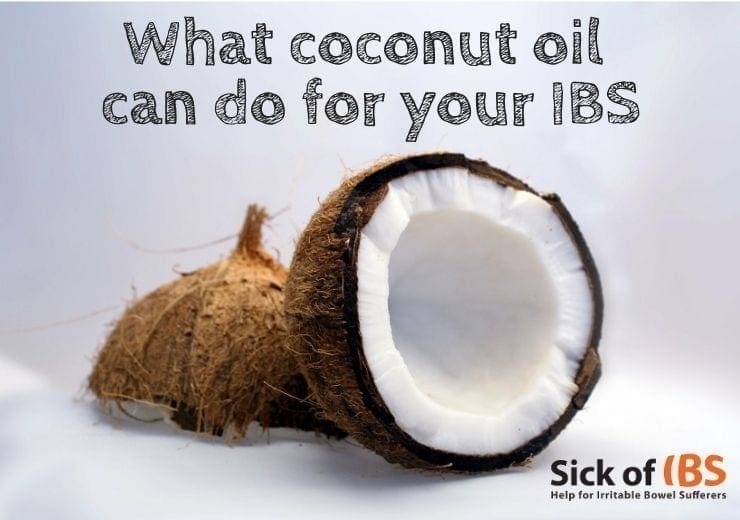The virtues of coconut oil have been talked about a great deal. So let’s see how this versatile oil may help relieve some common IBS symptoms such as constipation, Candida and reflux.
Is coconut oil good or bad for your health?
For years we have been told that most fats are bad for our health.
While reading an excellent book called Grain Brain, I discovered that new research is confirming that the consumption of non-trans vegetable fats, like olive oil and coconut oil, is actually essential to stay in good health.
Coconut oil, like other plant-based oils, does not contain any cholesterol. And research has shown that extra virgin unprocessed coconut oil contains anti-inflammatory and anti-microbial properties.
Why coconut oil can relieve constipation
Constipation can have multiple causes, including lack of exercise, not drinking enough water, not consuming enough insoluble fiber, not to mention stress and anxiety. and low magnesium levels.
Dr. Lauryn, a nutritional therapist, states that it is the “medium-chain fatty acids (MCFAs), which are a secret for constipation relief. MCFAs provide quick energy for your intestinal cells that boost their metabolism and hence, stimulate your bowel movements. MCFAs help to soften your stool too.”
MCFA’s are abundant in coconut oil.
How much should you take?
She suggests starting slowly, taking 1-2 teaspoons melted per day to start with, either directly, or mixed in a warm drink, or added to meals. Then you can gradually increase the amount to 1-2 tablespoons, or until you start to feel some relief from constipation.
If you suffer from chronic constipation, here are some other natural methods that may well help you too.
Coconut oil and Candida
This oil can soothe the entire digestive tract thanks to its anti-inflammatory properties.
Its anti-microbial properties can be very useful against dysbiosis (Sibo or Candida). I have seen IBS sufferers on forums that swear by taking 2 tablespoons a day. (This can be one in the morning, and the other later in t he day alone or in a warm drink or a meal), Again start with a small amount and increase it gradually to make sure it does not cause you any stomach cramps.
he day alone or in a warm drink or a meal), Again start with a small amount and increase it gradually to make sure it does not cause you any stomach cramps.
This alone may not be sufficient to beat dysbiosis, but as part of a regular habit, it can certainly contribute to rebalancing gut bacteria and improving digestion.
Making coconut a habit
You’ll get the most benefits of coconut oil when you make ot a habit. When I decided to adopt coconut oil, I found that making it a habit was actually more challenging than expected. So if you forget, go easy on yourself!
Coconut oil and Reflux
Due to its anti-inflammatory properties, consuming coconut oil helps coat the inside of the oesophagus and reduce irritation. This can be really helpful if you regularly suffer from acid reflux.
The best way to do this is to take directly some oil on a spoon outside mealtimes. Just let it melt in your mouth, and swallow it slowly. If you can do this before you go to bed, your digestive tubes benefit from the action of the oil during the night.
But I don’t like coconut
If you have IBS and don’t like the coconut taste, there are organic brands available that use a steaming technique to remove the strong coconut taste. Although this technique also removes some of the nutrients and somewhat reduces its properties, this can still be a viable option and worth trying.
7
